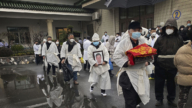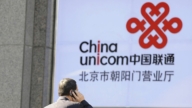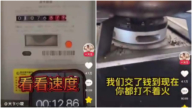【新唐人2013年08月07日訊】近期,世界第三大製藥商葛蘭素史克公司,在中國大陸賄賂中共官員和醫生的醜聞被曝光,也將中國醫療系統觸目驚心的腐敗內幕赤裸裸的呈現在了民眾眼前。有分析指出,收取回扣和紅包已經成為中國醫療系統的潤滑劑和生命線。在現有的中共體制下,有良心的醫生卻只能成為「另類」而無法生存,醫療行業的全面腐敗也成為必然。
據中共喉舌《新華社》的報導指稱,葛蘭素史克中國公司為行賄醫生,建立了一套完整的報銷模式,通過虛報會議、學術講座和直接提供現金等方式行賄,達到提高藥品銷量的目的。
葛蘭素史克在中國大陸行賄並非個案。近年來,輝瑞、禮來等多家外資藥企都因涉嫌在華行賄受到調查。這些外企在本國大都守法經營,卻都無法避免在中國被「潛規則」同化。
《財新網》分析指出,這種現象反映出了中國醫藥體系的行業弊端。
大陸某市主治醫師李敬(化名)也認為,中國醫療行業的運行體制下,層層的所謂招標和監管制度,卻使藥品在眾多流通環節中不斷成為貪腐的工具。
大陸某市主治醫師李敬(化名):「正規的醫院需要通過國家招標才能把藥品引進來。如果藥廠想要進入醫院的話,首先要進入國家的招標工作,需要一些手段才能進去。然後醫院再從招標目錄裡再進入醫院渠道,醫藥代表或是藥方、廠商就要打通醫院的院級領導和藥劑科。」
《燕趙晚報》評論文章認為,大陸醫藥領域賄賂從國家及醫療機構一直到鄉鎮衛生院,幾乎不存在太多的淨土,以至於拒絕並揭秘潛規則的「極個別」醫生反倒成了另類而混不下去。
時事評論員邢天行表示,中共以文革等各種手段摧毀了中國人的道德體系後,導致各行業中,有良知的從業者難以生存,醫療行業的全面腐敗也成為必然。
時事評論員邢天行:「你翻開中國古代那些醫書,那些有名的醫生他留下來的道德都是很講究的,就是在選拔這個徒弟上。尤其是他整個普遍社會的道德文化都是講究善惡有報的,人命關天,所以對人的生命是一定要關注的。現在到了中共這個時期就是把傳統文化,尤其是醫德和善惡有報這個徹底摧毀了。」
最近曝光的福建漳州「醫療腐敗案」,被揭露出藥品價格裏面80%都是「公關費用」,全市區縣73家醫院百分之百涉案。中共國務院醫改專家諮詢委員會委員李玲也坦言,這是全國普遍現象,漳州只是冰山一角。
大陸醫療機構官員趙慶海(化名)指出,行政機關和政府公務人員受賄是醫療系統腐敗的源頭。
大陸醫療機構官員趙慶海(請變音):「他講『全軍覆沒』他是要保護那些高管才會喊『全軍覆沒』的。醫生的受賄是領導要他受賄,給他創造受賄的條件。為甚麼領導要給他創造受賄的條件呢?是領導要受賄。他一個人受賄的話大夫會舉報他,所以他讓大夫也受賄。苦的是老百姓,它形成一個受賄利益集團。」
英國《路透社》文章則指出,賄賂已經成為一種能夠幫助中國公立醫院維持運作的潤滑劑。對於中國醫療系統的混亂和醜陋,當局有著不可推卸的責任。
文章引述一位在醫藥行業工作長達15年的高管指出,賄賂和貪污已經蔓延到公立醫院的各個層面。在當前的醫療體系,賄賂已經被當做是必需品。
採訪/常春 編輯/李明飛 後製/王明宇
Moral Collapse of China’s Medical System
Recently, the world’s third-largest drug manufacturer
GlaxoSmithKline (GSK)’s bribery of Chinese
officials and doctors was exposed, revealing to the public
the shocking crimes of China’s medical system.
Analysts say that kickbacks and money under the table
have become the lifelines of China’s healthcare system.
In the current Chinese Communist Party (CCP) regime,
conscientious doctors are ‘outsiders’ and cannot survive.
Some say the complete corruption of the
healthcare industry is inevitable.
According to the CCP mouthpiece, Xinhua News Agency,
GSK’s China operations established a complete reimbursement
model to bribe Chinese doctors by giving false information in
meetings, academic lectures and cash, to improve drug sales.
Cases of bribery such as GSK’s aren’t uncommon in China.
In recent years, Pfizer, Eli Lilly and a number of other foreign
pharmaceutical companies have been investigated for bribery.
Most of them are law-abiding in their home countries,
but they can’t avoid influence from China’s ‘unspoken rules.’
Writers at Caixin.com, a financial website, say that this reflects
the drawbacks of the medicine and drug industry in China.
Physician Li Jing (a pseudonym) from China also believes
that the system of China’s medical industry,
with its levels of so-called bidding and regulatory systems,
causes drugs to be a tool of corruption in
its many circulation channels.
Li Jing, physician: “Regular hospitals can only import drugs
through a country’s bidding process.
If drug manufactures want to enter hospitals,
they first need to enter the country’s bidding process,
through some means.
Then they can get into the channels of the hospital.
Drug manufacturers must get through hospitals’ leadership."
A report by Yanzhao Evening News says
there is not much pure land in China’s medical system.
Corruption exists from the national level to local villages.
Doctors who refuse to abide by the ‘unspoken rules’ are very few,
and have become outsiders and failures in the system.
Commentator Xing Tianxing says that
the CCP has destroyed people’ morality through
the Cultural Revolution and other political movements.
People with good conscience can’t survive in any area.
The total corruption of the healthcare industry is inevitable.
Commentator Xing Tianxing: “Ancient Chinese
medical books all talk about morality.
The overall society believed in retribution for one’s deeds.
They even selected students based on morality.
The CCP era has completely destroyed doctors’
morality and the belief of retribution.”
In a recently exposed medical corruption case in Zhangzhou,
Fujian province, 80% of drug prices were ‘public fees.’
All of the city’s 73 hospitals were involved in the scam.
Li Ling, a member of China’s State Council Medical Reform
Advisory Committee says that this is a common phenomenon.
Zhao Qinghai (a pseudonym), an official in China’s
Medical System says that
the source of corruption in the medical system is
executives’ and government officials’ taking bribes.
Zhao Qinghai: “It’s failed completely, even high level executives.
Doctors follow the orders from their superiors to take bribery.
Why do their leaders create the conditions for accepting bribes?
Because they also want bribes. It’s formed these interest groups.
It’s everyday people who suffer from all this.”
An article from Reuters pointed out that bribery has become
a way to help China’s public hospitals operate.
The CCP authorities cannot shed responsibility for
the chaotic and ugly state of China’s medical system.
The article quoted an executive who worked for 15 years
in the medical field as saying that bribery and corruption has
spread to all levels of public hospitals.
In China’s current health care system,
bribery has become a necessity.




























